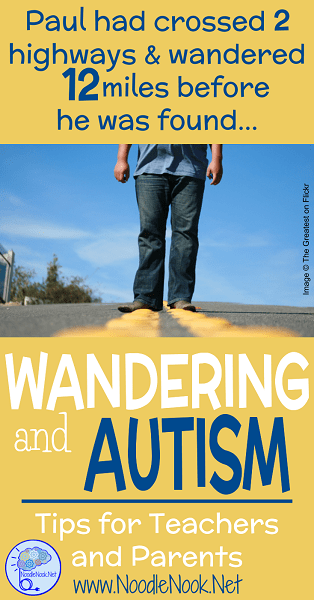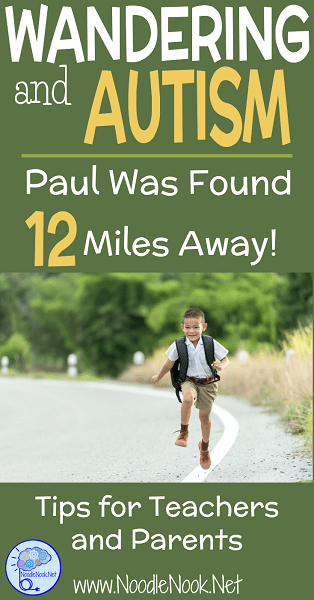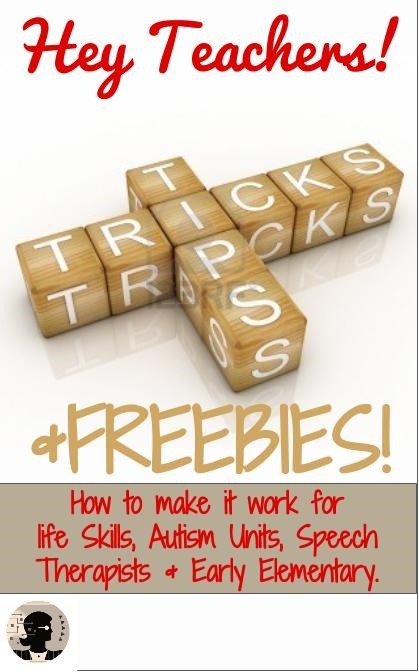Wandering in children with Autism is common… Here’s my story as a teacher who has had to help find a missing child as well as what tips on Autism and wandering for parents and teachers.
Wandering in Autism Terrifies Me
It was terrifying. Absolutely terrifying.
When you work with students who have special needs, specifically Autism, you know you can get some unusual behavior. I have written before about students who wander or run and strategies for teachers. All that cool collected advice flew out the window when I found myself driving down the side of a 6 lane highway looking for a student. There is no other way to explain what terror feels like than that.
Mom Looked Up and Paul Was Gone…
I just kept hoping we would find him and find him quickly… and praying that he was okay. For this story, I will call him Paul. Paul is not one of my students, but his teacher (Mrs M) called me about an hour after the end of the school day asking for help. Paul’s parents called her and told her Paul had been very worked up about going back to school when he got off the bus. His parents explained he would go on Monday and set to getting dinner ready and their other kids situated. When they called Paul about 30 minutes later, he was nowhere to be found. They called Mrs. M to see what had happened, if he had shown back up to school, and, if not, if she would help them look for him.
Now, even though I did not lose Paul, I HAVE had to search for students before that I did teach. It is so scary when all the possible bad things that can happen when a child wanders away start running through your head. When Mrs. M called me, I was more than willing to help. She had notified her campus administration, but wanted to do more. She took to her car and started driving the route between campus and Paul’s house to see if she could find him.
[tweetthis twitter_handles=”@_yoteacher”]Tips and Tricks for Teachers and Parents on Wandering and Autism. Story of a student found 12 miles away… Wow![/tweetthis]
All Hands on Deck
Police were out looking. Campus Administrators were looking in all the school’s nooks and crannies. Family and friends were heading out to Paul’s favorite places. Mrs M and I were looking on the roughly 3 mile route between home and school as well as the bus route taken in the morning and afternoon. That’s where I found myself- in my car scanning the road for Paul.
I found nothing. A blessing and a curse.
Thinking Back to Marissa
The entire time I was driving around looking for Paul all I could do was think of Marissa (not her real name). She was a student that attended a neighboring school and lived in a group home. She had run out one day and about 20 minutes later she was hit by a teenage driver on her way home from school. It wasn’t the driver’s fault, Marissa darted out into the street, but just the thought of that incident kept me on perpetual edge. It happens more than we think- kids with Autism wandering or eloping out in the night or out in plain sight. Even having been through the ordeal of searching for a missing kid, I cannot imagine being the parent of a child who wanders, always worried about where they are or when they will slip from safety to danger.
Finding a Missing Child
It was nearly 6 hours after Paul had gone missing before he was found. His home was approximately 3 miles from school. He was found 12 miles from home wandering on a freeway frontage road. He had crossed two major highways and passed a body of water.
12 miles.
We were looking for a needle in the wrong haystack… we weren’t even close. A passerby had seen him and thought it looked wrong, so they called the police. How many other people just drove by? With wandering, escape and eloping behavior being so prevalent in kids with Autism, it is no wonder they are 40 times (yup, you read that right- forty times) more likely to be fatally injured than their non-disabled counterparts and the number one injury is drowning.
So What Now?
To say his mother was relieved and distraught at the same time was an understatement. Mrs. M was also very anxious about the entire thing. Granted, Paul had wandered off during Mom’s watch, but it could have easily happened during hers. What could she do to keep what happened with Paul from happening again or happening to another of her students? As we talked, we thought of a couple of things we should start to recommend to parents of children who wander, elope or escape.
- Talk with neighbors, local first responders, and friends. Having a relationship with those people helped so much for Paul, but everyone who has a child like him can benefit from a network of people who can recognize a child and acknowledge their unique needs. A phone tree can also help. When help is needed, a designated network of local eyes and ears can make a huge difference.
- Keep Up to Date with Pictures and Preferences. A current picture and memory of what a child is wearing that day is so helpful to police. Also, like Paul, your child may be picked up by an officer (read:stranger) and not someone familiar with their needs. Being able to give an officer something to break the tension can help, like telling them Paul liked to talk about the local baseball team. Those details matter. No matter what, as a parent or even teacher, keep a current picture of the child handy and their weight & height up to date are a must. Accurate descriptions make a big difference with police, first responders, and anyone who is tapped to help find a missing kid.
- Teach basic safety. I used to practice crossing the street with my students, but I know many teachers who don’t. Basic safety like asking for help, calling 911, and crossing the street can help a child navigate danger if they are lost or wander off. Identification bracelets, or pocket cards (literally just a laminated card with a child’s basic info, parent contact numbers, and simple instructions for someone who finds them) are also a must have. As a teacher, you may want to include making one part of your back to school lessons.
- Swim Safety. I know as a classroom teacher, I cannot help my students learn to swim. I do recommend to parents that they get lessons for their children so drowning chances are minimized. As teachers, we can help our students learn basic water safety with some social stories or lessons. I found these from Kid’s Health if you don’t know where to start: For PK-2, 3-5, and 6-8.
- Advocate Technology. Paul’s mom eventually got a wearable for her son, and I completely understand why. For her own peace of mind and to make it possible to find Paul anytime, she went with AngelSense. Mrs. M was a little worried about it in the beginning since there are some AngelSense features that felt intrusive to her in the classroom (like two way communication), but how many of us use cell phones with our kiddos to keep track of them? I know I do. Why shouldn’t Paul’s mom benefit from the same technology the rest of us do? After Paul had it awhile, Mrs. M hardly thought of it anymore. She and I both started recommending AngelSense to people as a necessary safeguard as soon as we found out about 10-second updates in ‘Runner’ Mode. Whatever the platform, as a teacher, advocate for wearables for wanders and children that elope. It literally can be the difference between life and death.
- Finally, secure the house and classroom. At home, parents should have an alarm system that alerts them when a door is opened. I have Ring at my house, Mrs. M has Nest, and you can find a litany of other products online. Even a simple cow bell on the door will work (yes, I live in Texas)! In the classroom, a chime on the door or a building approved child-proof door knob can help mitigate the anxiety and lower the chances of escape.
Tips and Tricks for Autism and Wandering
My heart breaks for parents with children who wander out of the house and I get so anxious when I hear stories of children with disabilities getting lost. If there is anything we can do to lower the risks, we must. Teachers, print this post or email it to parents with children who wander. Parents, look into the things on the list like swimming lessons, wearable technology, and identification bracelets. Paul was lucky, Marissa was not, but no child or parent should have to be tested like that.
Share this article now. Let’s prevent one child with Autism from being lost, hurt, or accidently killed.
Article Citation: [cite]




